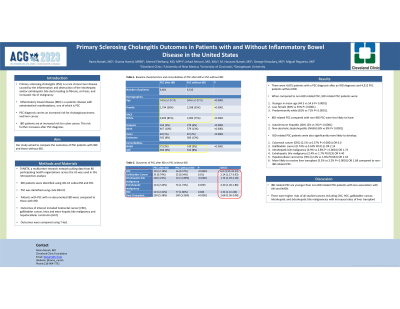Tuesday Poster Session
Category: IBD
P3594 - Primary Sclerosing Cholangitis Outcomes in Patients With and Without Inflammatory Bowel Disease in the United States
Tuesday, October 24, 2023
10:30 AM - 4:00 PM PT
Location: Exhibit Hall


Rama Nanah, MD
Cleveland Clinic
Cleveland, OH
Presenting Author(s)
Rama Nanah, MD1, Osama Hamid, MBBS1, Ahmed Eltelbany, MD, MPH1, Jehad Almasri, MD, MSc2, M Housam Nanah, MD1, George Khoudary, MD3, Miguel Regueiro, MD4
1Cleveland Clinic, Cleveland, OH; 2University of Cincinnati, Cincinnati, OH; 3Georgetown University, Washington, DC; 4Cleveland Clinic Lerner College of Medicine, Case Western Reserve University, Cleveland, OH
Introduction: Primary sclerosing cholangitis (PSC) is a rare chronic liver disease caused by the inflammation and destruction of the intrahepatic and/or extrahepatic bile ducts leading to fibrosis, cirrhosis, and increased risk of malignancy. Inflammatory bowel disease (IBD) is a systemic disease with extraintestinal manifestations, one of which is PSC. PSC diagnosis carries an increased risk for cholangiocarcinoma and liver cancer. IBD patients are at increased risk for colon cancer. This risk further increases after PSC diagnosis. Our study aimed to compare the outcomes of PSC patients with IBD and those without IBD.
Methods: TriNETX, a multicenter research network pulling data from 80 participating health organizations across the US was used in this retrospective analysis. IBD patients were identified using ICD-10 codes K50 and K51. PSC was identified using code K83.01. Patients with PSC with no documented IBD were compared to those with IBD. Outcomes of interest included Colorectal cancer (CRC), gallbladder cancer, Intra and extra hepatic bile malignancy and hepatocellular carcinoma (HCC). Outcomes were compared using T-test.
Results: There were 4,601 patients with a PSC diagnosis after an IBD diagnosis and 4,312 PSC patients without IBD. When compared to non-IBD related PSC, IBD related PSC patients were younger in mean age (44.5 vs 54.6 P< 0.0001), less female (38% vs 55% P< 0.0001) and predominantly white (81% vs 71% P< 0.0001). IBD related PSC compared with non-IBD PSC were less likely to have autoimmune hepatitis (AIH) (2% vs 3% P< 0.0001) and non-alcoholic steatohepatitis (NASH) (6% vs 8% P< 0.0001). IBD related PSC patients were also significantly more likely to develop colorectal cancer (CRC) (2.1% vs 0.37% P< 0.0001) OR 6.0, gallbladder cancer (0.74% vs 0.34% P0.011) OR 2.14, Intrahepatic bile malignancy (4.9% vs 2.8% P < 0.0001) OR 1.74, Extrahepatic bile malignancy (2.4% vs 1.7% P0.023) OR 4.40, hepatocellular carcinoma (HCC) (2.4% vs 1.8% P0.044) OR 1.34 and more likely to receive liver transplant (5.3% vs 3.2% P< 0.0001) OR 1.68 compared to non-IBD related PSC.
Discussion: IBD related PSC are younger than non-IBD related PSC patients with less association with AIH and NASH. There were higher risks of all studied cancers including CRC, HCC, gallbladder cancer, Intrahepatic and Extrahepatic bile malignancies with increased rates of liver transplant but similar 3- and 5-year survival rates.
Disclosures:
Rama Nanah, MD1, Osama Hamid, MBBS1, Ahmed Eltelbany, MD, MPH1, Jehad Almasri, MD, MSc2, M Housam Nanah, MD1, George Khoudary, MD3, Miguel Regueiro, MD4. P3594 - Primary Sclerosing Cholangitis Outcomes in Patients With and Without Inflammatory Bowel Disease in the United States, ACG 2023 Annual Scientific Meeting Abstracts. Vancouver, BC, Canada: American College of Gastroenterology.
1Cleveland Clinic, Cleveland, OH; 2University of Cincinnati, Cincinnati, OH; 3Georgetown University, Washington, DC; 4Cleveland Clinic Lerner College of Medicine, Case Western Reserve University, Cleveland, OH
Introduction: Primary sclerosing cholangitis (PSC) is a rare chronic liver disease caused by the inflammation and destruction of the intrahepatic and/or extrahepatic bile ducts leading to fibrosis, cirrhosis, and increased risk of malignancy. Inflammatory bowel disease (IBD) is a systemic disease with extraintestinal manifestations, one of which is PSC. PSC diagnosis carries an increased risk for cholangiocarcinoma and liver cancer. IBD patients are at increased risk for colon cancer. This risk further increases after PSC diagnosis. Our study aimed to compare the outcomes of PSC patients with IBD and those without IBD.
Methods: TriNETX, a multicenter research network pulling data from 80 participating health organizations across the US was used in this retrospective analysis. IBD patients were identified using ICD-10 codes K50 and K51. PSC was identified using code K83.01. Patients with PSC with no documented IBD were compared to those with IBD. Outcomes of interest included Colorectal cancer (CRC), gallbladder cancer, Intra and extra hepatic bile malignancy and hepatocellular carcinoma (HCC). Outcomes were compared using T-test.
Results: There were 4,601 patients with a PSC diagnosis after an IBD diagnosis and 4,312 PSC patients without IBD. When compared to non-IBD related PSC, IBD related PSC patients were younger in mean age (44.5 vs 54.6 P< 0.0001), less female (38% vs 55% P< 0.0001) and predominantly white (81% vs 71% P< 0.0001). IBD related PSC compared with non-IBD PSC were less likely to have autoimmune hepatitis (AIH) (2% vs 3% P< 0.0001) and non-alcoholic steatohepatitis (NASH) (6% vs 8% P< 0.0001). IBD related PSC patients were also significantly more likely to develop colorectal cancer (CRC) (2.1% vs 0.37% P< 0.0001) OR 6.0, gallbladder cancer (0.74% vs 0.34% P0.011) OR 2.14, Intrahepatic bile malignancy (4.9% vs 2.8% P < 0.0001) OR 1.74, Extrahepatic bile malignancy (2.4% vs 1.7% P0.023) OR 4.40, hepatocellular carcinoma (HCC) (2.4% vs 1.8% P0.044) OR 1.34 and more likely to receive liver transplant (5.3% vs 3.2% P< 0.0001) OR 1.68 compared to non-IBD related PSC.
Discussion: IBD related PSC are younger than non-IBD related PSC patients with less association with AIH and NASH. There were higher risks of all studied cancers including CRC, HCC, gallbladder cancer, Intrahepatic and Extrahepatic bile malignancies with increased rates of liver transplant but similar 3- and 5-year survival rates.
Disclosures:
Rama Nanah indicated no relevant financial relationships.
Osama Hamid indicated no relevant financial relationships.
Ahmed Eltelbany indicated no relevant financial relationships.
Jehad Almasri indicated no relevant financial relationships.
M Housam Nanah indicated no relevant financial relationships.
George Khoudary indicated no relevant financial relationships.
Miguel Regueiro: AbbVie – Advisory Committee/Board Member, Consultant, Unrestricted educational grants. Alfasigma – Advisory Committee/Board Member, Consultant. Allergan – Advisory Committee/Board Member, Consultant. Amgen – Advisory Committee/Board Member, Consultant. Bristol Myers Squibb – Advisory Committee/Board Member, Consultant, Unrestricted educational grants. Celgene – Advisory Committee/Board Member, Consultant, Unrestricted educational grants. Eli Lilly – Advisory Committee/Board Member, Consultant. Genentech – Advisory Committee/Board Member, Consultant, Unrestricted educational grants. Gilead Sciences – Advisory Committee/Board Member, Consultant, Unrestricted educational grants. Janssen – Advisory Committee/Board Member, Consultant, Unrestricted educational grants. Miraca Labs – Advisory Committee/Board Member, Consultant. Pfizer Inc – Advisory Committee/Board Member, Consultant, Unrestricted educational grants. Prometheus – Advisory Committee/Board Member, Consultant. Salix – Advisory Committee/Board Member, Consultant. Seres – Advisory Committee/Board Member, Consultant. Takeda – Advisory Committee/Board Member, Consultant, Unrestricted educational grants. Target RWE – Advisory Committee/Board Member, Consultant. UCB – Advisory Committee/Board Member, Consultant, Unrestricted educational grants. Wolters Kluwer Health – Royalties.
Rama Nanah, MD1, Osama Hamid, MBBS1, Ahmed Eltelbany, MD, MPH1, Jehad Almasri, MD, MSc2, M Housam Nanah, MD1, George Khoudary, MD3, Miguel Regueiro, MD4. P3594 - Primary Sclerosing Cholangitis Outcomes in Patients With and Without Inflammatory Bowel Disease in the United States, ACG 2023 Annual Scientific Meeting Abstracts. Vancouver, BC, Canada: American College of Gastroenterology.
